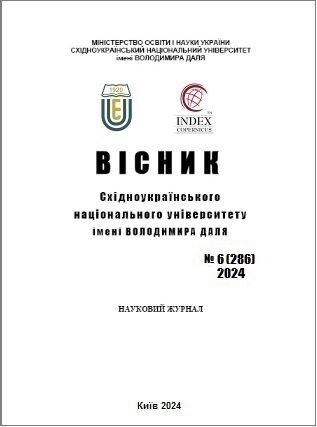Іnnovative entrepreneurship ecosystem: logistics, inclusion, digitization
DOI:
https://doi.org/10.33216/1998-7927-2024-286-6-104-109Keywords:
innovation, innovative activity, innovative infrastructure, financial security, development, risks and threats, digital platforms, digital business, transformation, digital economy, digital technologies, entrepreneurship ecosystem, smart entrepreneurship, economic security system, logistics system, logistics, digital transformation, logistics activity, digital logistics, organizational culture, socio-economic instability, business entitiesAbstract
The statistics show that the innovative ecosystem of production is a critical element of the current economy, which supports the development of new ideas, technologies and business models. Today's businesses can gradually adapt to the rapidly changing minds of the globalized world, where innovation becomes the main driver of competitive advantage. Three important aspects of the value ecosystem - logistics, inclusion and digitalization - play a key role in ensuring the effective functioning of businesses and supporting their growth. The method of the presented work is to highlight the features of the innovative ecosystem of enterprises with respect to such aspects as logistics, inclusion and digitalization. The main methods presented in the work: induction, deduction, logical, analysis, synthesis, inference, systematization. In the presented investigation, specific features have been identified. Logistics, as a part of the innovative ecosystem, makes it possible to optimize production processes and ensure a smooth exchange of goods and services at various stages of the manufacturing process. Innovative approaches to logistics operations will ensure not only greater efficiency, but also faster costs, improved customer service and reduced environmental impact. Inclusion, in its turn, represents a strategy for ensuring equal opportunities for all participants in business activities, including various social groups, small and medium-sized businesses, women, people with disabilities and other marginalized categories. Vaughn is committed to increasing social and economic justice, developing innovative potential and increasing social diversity. Digitalization is one of the main disruptive forces that is changing traditional business processes. By introducing digital technologies to manufacturing and management processes, businesses can significantly improve their efficiency, ensure data accuracy, improve access to information and produce their products. and services are more accessible to fellow residents. Digital tools open up new opportunities for the development of start-ups and the creation of innovative products. Together, these three components - logistics, inclusion and digitalization - form an important foundation for the development of an innovative ecosystem of enterprises that contributes not only to economic growth, but also to social progress. They will ensure the resilience and adaptability of businesses in a dynamic environment, allowing them to effectively respond to new challenges and find innovative solutions.
References
1. Desyatnyuk, O., Krysovatyy, A., Ptashchenko, O. and Kyrylenko, O. Financial Security in the Conditions of Globalization: Strategies and Mechanisms for the Protection of National Interests. Econ. Aff., 69(Special Issue): 2024. 261-268
2. Desyatnyuk, O., Krysovatyy, A., Ptashchenko, O. and Kyrylenko, O. Enhancing financial inclusivity and accessibility of financial services through digital technologies. AD ALTA: Journal of Interdisciplinary Research, 2024. Pp. 65-69. ISSN 1804-7890 https://www.magnanimitas.cz/ADALTA/140142/papers/A_13.pdf
3. Karchevskyi, M., Losych, S., & Germanov, S. Socialization of artificial intelligence and transhumanism: legal and economic aspects. Baltic Journal of Economic Studies, 2023. 9(1), 61-70. https://doi.org/10.30525/2256-0742/2023-9-1-61-70
4. Kateryna Alekseieva, Mykhailo Maletych, Olena Ptashchenko, Olena Baranova and Zoriana Buryk. State Business Support Programs in Wartime Conditions. Economic Affairs, Vol. 68, No. 01s, pp. 231-242, February 2023 DOI: 10.46852/0424-2513.1s.2023.2 URL: https://economicaffairs.co.in/Journal/abstract/id/NTcyMw==
5. Michal Kosinski, David Stillwell & Thore Graepel, “Private traits and attributes are predictable from digital records of human behavior”, 2013. 110:15 Proceedings of the National Academy of Sciences 5802.
6. Zaitsev, Y., Krysovatyy, I., Gavkalova, N., Sobko, O. and Boichyk, V. Interaction of Digitization and Corporate Social Responsibility in the Context of Sustainable Development. Econ. Aff., 69(Special Issue): 2024. 217-227. URL: https://ndpublisher.in/admin/issues/EAv69n1w.pdf
8. Баранов О. А. Трансформація: соціальна & цифрова & правова : монографія у 3-х т. Т. 1. Порятунок цивілізації: економіка результату. Одеса : Видавничий дім «Гельветика». 2022. 272 с.
9. Доронін І. М. Цифровий розвиток та національна безпека у контексті правових проблем. Інформація і право. 2019. № 1. С. 29-36.
10. Шевченко І.О. Імнадзе І.Н. Застосування управлінських та маркетингових інноваційних технологій для забезпечення розвитку цифрової торгівлі на глобальних ринках Інтелект ХХІ No 1 ‘2023 C.47-53 URL http://www.intellect21.nuft. org.ua/journal/2023/2023_1/11.pdf
11. Шевченко І.О. Стратегія розвитку цифрової економіки в умовах глобалізації Журнал стратегічних економічних досліджень, No 6(11), 2022. C.35-42 DOI: 10.30857/2786-5398.2022.6.7
12. Rüßmann M. Industry 4.0: The Future of Productivity and Growth in Manufacturing Industries. The Boston Consulting Group. Inc. 2015. URL: https://www. bcg.com/publications/2015/engineered_products_project_business_industry_4_future_productivity_growth_manufacturing_industries
13. Doran J., McCarthy N., O’Connor M. The role of entrepreneurship in stimulating economic growth in developed and developing countries. Cogent Economics & Finance. 2018. Vol. 6. Iss. 1. Art. 1442093. DOI: https://doi.org/10.1080/23322039.2018.1442093
14. Liu, J., Loan, K., Mousa, S., Ali, A., Muda, I., & Cong, P. Sustainability and natural resources management in developed countries: The role of financial inclusion and human development. Resources Policy, 2023. Vol. 80. URL: https://doi.org/10.1016/j.resourpol.2022.103143
15. Thomson, J., & Mason, H. "Machine Learning for Predictive Pricing: Improving Retail Profitability with Data-Driven Insights". Journal of Retail Analytics, 2021. 12(3), 45-60.
16. Gallego-Losada, M.-J., Montero-Navarro, A., García-Abajo, E., & Gallego-Losada, R. Digital financial inclusion. Visualizing the academic literature. Research in International Business and Finance, January, 2023.Vol. 64. URL: https://doi.org/10.1016/j.ribaf.2022.101862
17. Gupta J., Cornelissen V., Ros-Tonen M. Inclusive development. Encyclopedia of Global Environmental Governance and Politics. Cheltenham, 2015. P. 35-44.
18. Jong, A., Shahriar, A. Z., & Shazia, F. Reaching out to the unbanked: The role of political ideology in financial inclusion. Journal of International Money and Finance, September, 2022.Vol. 126. URL: https://doi.org/10.1016/j.jimonfin.2022.102678
19. Liu, J., Loan, K., Mousa, S., Ali, A., Muda, I., & Cong, P. Sustainability and natural resources management in developed countries: The role of financial inclusion and human development. Resources Policy, January 2023. Vol. 80. URL: https://doi.org/10.1016/j.resourpol.2022.103143

